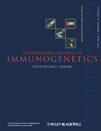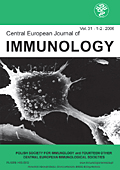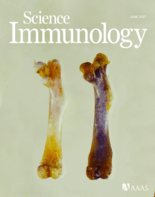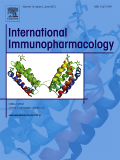
CRITICAL REVIEWS IN IMMUNOLOGY
Scope & Guideline
Illuminating Insights in Immunological Research
Introduction
Aims and Scopes
- Cancer Immunology:
The journal extensively covers the role of the immune system in cancer progression and therapy, emphasizing innovative immunotherapies and the mechanisms of immune evasion by tumors. - Autoimmunity and Inflammation:
Research articles explore the underlying mechanisms of autoimmune diseases, highlighting the roles of specific immune cells and cytokines in disease pathogenesis. - Infectious Disease Immunology:
The journal addresses the immune response to infectious agents, including viral and bacterial infections, with a focus on novel therapeutic approaches and vaccine development. - Network Pharmacology and Bioinformatics:
A significant portion of the research employs network pharmacology and bioinformatics analyses to uncover molecular mechanisms and identify potential therapeutic targets in various diseases. - Translational Immunology:
The journal emphasizes translational research that bridges basic immunological discoveries with clinical applications, particularly in cancer therapy and regenerative medicine.
Trending and Emerging
- m6A RNA Methylation:
There is a growing interest in the role of m6A RNA methylation in regulating immune responses and cancer biology, indicating a trend towards understanding epitranscriptomic modifications. - Natural Killer (NK) Cell Therapies:
Research on NK cells has surged, particularly their application in immunotherapy for various cancers, highlighting their potential as a promising therapeutic avenue. - Artificial Intelligence in Immunology:
The integration of AI and machine learning techniques to analyze immunological data and enhance precision medicine approaches is an emerging theme, underscoring the need for advanced computational tools. - Network Pharmacology and Systems Biology:
The use of network pharmacology and systems biology approaches to understand complex immune interactions and develop novel therapies is on the rise, reflecting a more holistic view of immunological research. - Gut Microbiome and Immunity:
Research exploring the interactions between the gut microbiome and the immune system is increasingly featured, indicating its relevance in health and disease management.
Declining or Waning
- Traditional Immunotherapy Approaches:
Research focusing on traditional immunotherapies such as monoclonal antibodies has decreased as the field increasingly shifts towards more innovative and personalized approaches. - Basic Innate Immunity:
While still important, foundational studies on innate immune mechanisms have become less prominent compared to studies exploring specific immune responses related to cancer and chronic diseases. - Vaccine Mechanisms:
The frequency of papers solely discussing vaccine mechanisms without a focus on novel adjuvants or delivery systems has declined, reflecting a shift towards more integrated approaches in vaccine research.
Similar Journals

CLINICAL AND EXPERIMENTAL IMMUNOLOGY
Shaping the Future of Immunological ScienceClinical and Experimental Immunology, published by Oxford University Press, is a premier journal that has been a cornerstone in the field of immunology since its inception in 1966. With an ISSN of 0009-9104 and an E-ISSN of 1365-2249, this journal holds a significant position in academic research, currently ranking in the Q2 category for both Immunology and Allergy (2023). Its impactful contributions are reflected in its Scopus rankings, where it stands at Rank #63 out of 233 in Immunology and Allergy, placing it in the 73rd percentile, and Rank #73 out of 236 in Immunology and Microbiology. Researchers, healthcare professionals, and students will find this journal an invaluable resource for cutting-edge studies, reviews, and clinical advancements in the ever-evolving domain of immunology. While the publication does not offer open-access options, it remains a pivotal platform for disseminating knowledge that impacts both clinical practice and experimental research.

International Journal of Immunogenetics
Unlocking the Secrets of ImmunogeneticsInternational Journal of Immunogenetics, under the esteemed publication house WILEY, serves as a pivotal platform for researchers and professionals in the fields of immunology and genetics. With an ISSN of 1744-3121 and an E-ISSN of 1744-313X, this journal offers a rich repository of scholarly articles and research findings that advance our understanding of immune system genetics. Hailing from the United Kingdom, the journal maintains an impactful presence with category quartiles reflecting a Q3 rating in Genetics and Immunology and a Q2 in Medicine (miscellaneous), positioning it as a credible source of scientific knowledge. It encompasses studies from converged years ranging from 1974 to 1996 and again from 2005 to 2024, ensuring a robust collection of both historical and contemporary research. Researchers are encouraged to engage with its content, given its Scopus rankings—highlighting the journal’s relevance in a competitive academic landscape. As an open-access title, International Journal of Immunogenetics strives to enhance accessibility to vital research, fostering collaboration and innovation in the genetic and immunological domains.

Central European Journal of Immunology
Transforming Research into Impactful SolutionsCentral European Journal of Immunology is a premier publication dedicated to advancing the field of immunology and allergy research. Established in 1996 and published by TERMEDIA PUBLISHING HOUSE LTD, this open access journal has consistently provided a platform for innovative research and comprehensive reviews since its transition to open access in 2002. With an ISSN of 1426-3912 and E-ISSN of 1644-4124, it embraces a global readership while being rooted in Poland. The journal, with a notable Q3 ranking in both the categories of immunology and allergy in 2023, positions itself within the competitive landscape of scientific discourse, as reflected in its Scopus rankings. Designed for researchers, professionals, and students, the Central European Journal of Immunology not only disseminates significant findings but also fosters collaboration and innovation in the immunological sciences, making it a vital resource for those seeking to stay current in this rapidly evolving field.

Immunological Medicine
Empowering Innovation in Immunological MedicineImmunological Medicine, published by Taylor & Francis Ltd, is an esteemed open-access journal that has made significant strides in the field of immunology since its establishment in 2018. With an E-ISSN of 2578-5826, the journal has quickly gained recognition for its contribution to advancing immunological research, evidenced by its impressive ranking in the Q2 quartile for both immunology and allergy. Positioned in the United Kingdom, it offers a platform for publishing high-quality original research, reviews, and case studies that delve into the complex interactions of the immune system and its implications for human health. The journal serves as a vital resource for researchers, professionals, and students engaged in the burgeoning fields of immunology, providing open access to a wide audience and fostering collaboration and innovation. With a current Scopus ranking of #81 out of 233 in Immunology and Allergy and #97 out of 236 in Immunology and Microbiology, the journal aims to enhance the visibility and impact of cutting-edge research by bridging the gap between academia and clinical practice.

Science Immunology
Connecting Science and Solutions in ImmunologyScience Immunology, published by the American Association for the Advancement of Science, is a leading journal in the field of immunology, recognized for its significant impact and rigor in advancing our understanding of immune responses and complex diseases. With an impressive impact factor that places it in the Q1 category of both immunology and allergy, as well as miscellaneous medicine, this journal is ranked #7 and #8 in their respective Scopus categories, reflecting its high-quality research output. Since its inception in 2016, Science Immunology has been at the forefront of interdisciplinary immunological research, fostering crucial insights that link immunology with pressing health challenges. The journal is committed to providing open access to its content, ensuring that groundbreaking findings are accessible to a global audience of researchers, professionals, and students. Its anthology not only addresses fundamental immunological mechanisms but also enhances the dialogue on translational applications and therapeutic interventions, solidifying its position as an essential resource within the scientific community.

CELLULAR IMMUNOLOGY
Exploring Pioneering Research in ImmunologyCELLULAR IMMUNOLOGY is a prestigious journal published by Academic Press Inc. Elsevier Science, dedicated to advancing the field of immunology. Established in 1970 and converging ongoing research up to 2024, this journal has carved out a significant niche within the academic community, boasting a notable Q2 ranking in the Immunology category and holding a respectable 67th percentile ranking within Scopus for its contributions to the disciplines of Immunology and Microbiology. The journal serves as a vital platform for disseminating high-quality research, reviews, and methodologies that elucidate the intricacies of cellular immune responses, thereby benefiting researchers, professionals, and students alike. Although it does not offer open access, the journal's impact is evidenced by its comprehensive coverage of pioneering studies and ongoing developments in the immunological sciences, positioning it as an essential resource for those seeking to deepen their understanding and engage with the latest findings in cellular immunology.

GENES AND IMMUNITY
Pioneering Insights into Genetic Influences on ImmunityGENES AND IMMUNITY, published by SpringerNature, is a leading scholarly journal dedicated to advancing the field of genetics and immunology. With an impressive impact factor and a distinguished ranking in the Q1 quartile of both Genetics and Immunology disciplines for 2023, this journal serves as a pivotal platform for researchers and professionals looking to explore the intricate relationships between genetic factors and immune responses. Established in 1999 and continuously published until 2024, it features high-quality peer-reviewed research articles, reviews, and commentary that address critical issues and recent advancements in the field. The journal adheres to rigorous academic standards, evidenced by its strong Scopus rankings, making it a valuable resource for students, researchers, and practitioners alike who are seeking to deepen their understanding of genetics' role in immunity. For those looking to keep abreast of cutting-edge insights, GENES AND IMMUNITY is an essential read.

JOURNAL OF IMMUNOLOGY
Unveiling the Secrets of ImmunityWelcome to the JOURNAL OF IMMUNOLOGY, a prestigious publication associated with the American Association of Immunologists and dedicated to advancing the field of immunology. With a rich history dating back to 1945, this journal is renowned for its high-impact research, evident in its notable 2023 Q1 rankings in both Immunology and Allergy, as well as its strong positions in Scopus rankings—Rank #68 in Immunology and Allergy and Rank #79 in Immunology and Microbiology. Although it operates on a subscription basis, its commitment to publishing cutting-edge studies ensures that it remains a vital resource for scientists, healthcare professionals, and students alike. As the journal continues to pave the way for innovative research and breakthroughs in immunological science, it facilitates a platform for dialogue and discovery among researchers and practitioners across the globe.

Immunity
Advancing the frontiers of immunological science.Immunity is a premier journal published by CELL PRESS that has positioned itself at the forefront of immunological research since its inception in 1994. With its ISSN 1074-7613 and E-ISSN 1097-4180, this prestigious journal is recognized for its significant contribution to the fields of Immunology, Allergy, and Infectious Diseases, consistently achieving a Q1 ranking in these categories as per 2023 metrics. The journal is highly esteemed within the academic community, holding impressive Scopus rankings—4th out of 344 in Infectious Diseases and 3rd in both Immunology and Immunology and Allergy—placing it in the 98th percentile. Although not an Open Access journal, it provides critical insights and research developments that empower researchers, healthcare professionals, and students alike. With a commitment to advancing scientific knowledge, Immunity is crucial for those interested in understanding immune responses and their implications for health and disease.

International Immunopharmacology
Exploring Innovative Solutions in ImmunopharmacologyInternational Immunopharmacology, published by Elsevier, stands as a prominent journal within the disciplines of immunology and pharmacology. With an ISSN of 1567-5769 and an E-ISSN of 1878-1705, this esteemed journal is based in the Netherlands and features a robust commitment to disseminating high-quality research from its inception in 2001 through 2024. The journal has achieved impressive rankings, securing a Q1 category in Pharmacology and Q2 in both Immunology and Immunology and Allergy as of 2023. With its strategic focus on bridging the gap between immunology and pharmacological applications, International Immunopharmacology attracts a diverse readership, including researchers, healthcare professionals, and students interested in the latest advancements in therapeutic agents and immune system modulation. Furthermore, it offers an open access option, enhancing the accessibility and reach of its invaluable content. As a pivotal resource in the field, this journal not only facilitates the exchange of innovative ideas but also fosters a deeper understanding of the complexities of immunopharmacology in today’s research landscape.